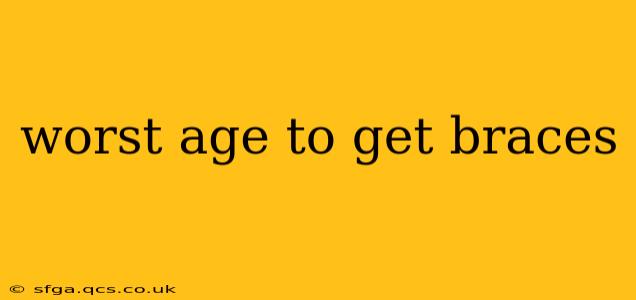There's a persistent myth that there's a "worst" age to get braces. The truth is far more nuanced. While there's no single worst age, certain ages present unique challenges and considerations. This comprehensive guide will explore the various stages of life and address the common concerns surrounding orthodontic treatment at different ages. We'll also tackle frequently asked questions to provide a clear and comprehensive understanding.
Is there an age limit for getting braces?
No, there's no strict upper age limit for getting braces. Orthodontic treatment can be beneficial for adults of any age. While younger patients often have faster bone remodeling, making treatment quicker, adults can achieve excellent results with proper care and commitment. The focus is on achieving the best possible outcome for the individual, regardless of age.
What are the challenges of getting braces as an adult?
While adults can absolutely benefit from orthodontic treatment, some challenges exist:
- Longer Treatment Time: Adult bone remodeling tends to be slower than in adolescents, potentially lengthening the overall treatment time.
- Gum Disease: Pre-existing gum disease can complicate treatment and may require addressing before braces are fitted.
- Root Resorption: In some cases, there's a slightly increased risk of root resorption (loss of tooth root structure) in adults, though this is generally manageable with proper care.
- Time Commitment: Adults often have busier schedules, requiring more careful planning around appointments and treatment protocols.
What are the challenges of getting braces at a younger age?
While often considered the ideal time for braces, younger ages also have potential drawbacks:
- Cooperation: Younger children may struggle with proper oral hygiene or wearing retainers consistently, potentially impacting treatment success.
- Growth Changes: Ongoing facial growth can sometimes influence treatment and might require adjustments during the process.
- Financial Considerations: Orthodontic treatment can be costly, and financial planning is essential for families with multiple children requiring treatment.
Are braces more difficult for adults?
While treatment might take longer for adults, the difficulty isn't inherently greater. Modern orthodontic techniques, such as Invisalign, offer greater comfort and discretion, making treatment more manageable for adults with busy lifestyles. The key factor is the patient's commitment to following the orthodontist's instructions.
What is the best age to get braces?
The "best" age depends entirely on individual needs and circumstances. Early intervention can sometimes prevent more complex problems later on, but effective treatment is possible at any age. A consultation with an orthodontist is crucial to determine the ideal timing and approach for each individual. They can assess factors like jaw growth, tooth alignment, and overall oral health to develop a personalized treatment plan.
Is it too late for braces in my 30s, 40s, or 50s?
Absolutely not! It's never too late to improve your smile and oral health. Many adults in their 30s, 40s, and 50s successfully undergo orthodontic treatment, achieving significant improvements in their teeth alignment and bite. Modern techniques and technologies make treatment comfortable and discreet, fitting easily into adult lifestyles.
Conclusion:
The focus should be on finding a qualified orthodontist who can assess your individual needs and create a tailored treatment plan. Age should not be the primary determining factor in deciding whether or not to get braces. The true determining factor is your commitment to improving your oral health and achieving your ideal smile. Remember to schedule a consultation to discuss your options and address any concerns you may have.
